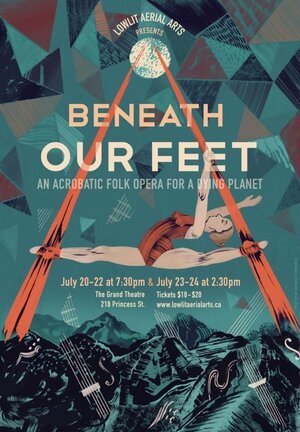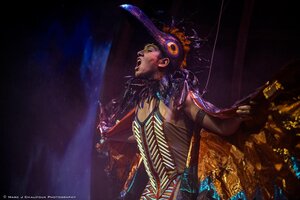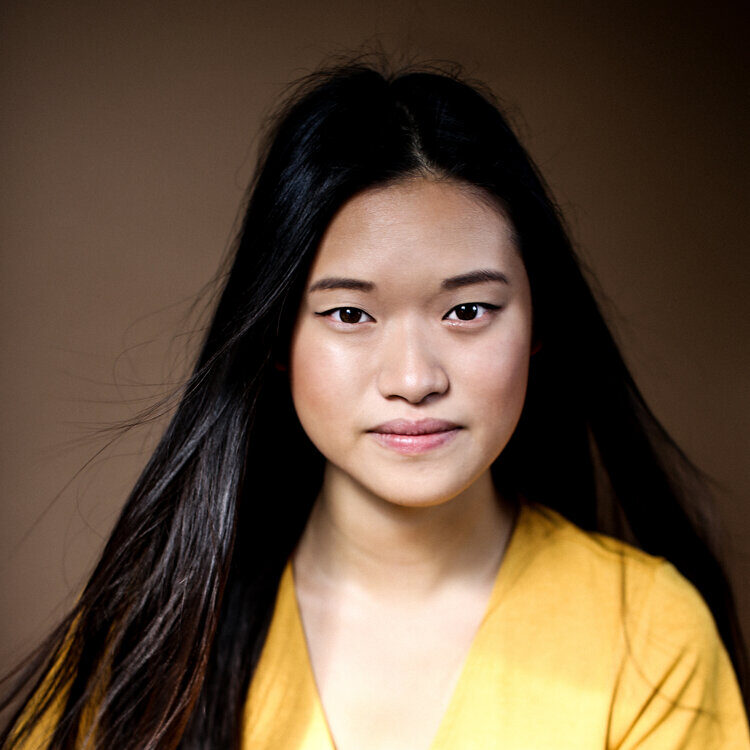Art and Activism: An Interview with Jane Kirby

“I sort of accidentally ran away and joined the circus.”
Jane Kirby had recently graduated with a Masters in International Development when she was beginning to feel burnt out from working in non-profits and social justice organizations. At first, circus was a fun escape—but now, she reflects upon how her background in activism bleeds into her work as a circus artist.
Kirby, whose main discipline within circus is vertical aerial arts, is naturally drawn towards art that pushes boundaries and challenges the status quo. Circus is an art form that often defies conventions—historically, it has been a sanctuary for people on the fringe of society, and importantly to Kirby, it allows for females to exhibit their strength in a way that is not stereotypically feminine. Despite this, Kirby has noticed that professional circus has a lot less women in positions of power. “The bigger the show, the more the budget, the fewer the women onstage… so it’s a big priority for me to feature women onstage, and strong women—not just women who are being tossed around by men.”
Although Kirby’s circus performances typically do not include explicit feminist messages, she believes that her feminist way of thinking and working does not go unnoticed by audiences. “I think people do notice, regardless of whether they’re thinking about it, I think they notice if it’s a woman throwing a man up in the air.”
All this begs the question: Why does it matter? Can art actually make a difference? Although Kirby is unsure whether art can change the world in and of itself, she still believes in its importance. “Having art that is challenging the status quo, and that is resisting something, and that is presenting alternative voices and viewpoints is huge,” she says, telling me about her experience performing a show about climate change in Beaumont, Texas, one of the biggest hubs of the oil industry in the US. Although she admits that many of the people seeing the show were already “the converted,” she says that in Beaumont in particular, environmentalists may feel isolated in their beliefs, and the show was a way to affirm them and galvanize them to take action.
Another example that came up took place in Kingston in early 2015 during the celebration of Sir John A MacDonald’s 200th anniversary. Dear John; Louis David Riel was performed by Métis artist David Garneau in front of the Sir John A. Macdonald statue in City Park. Garneau, playing Louis Riel, went through a series of tactics in attempt to get through to his oppressor, played by the statue. Despite the fact that he played a huge role in the genocide against Indigenous people in Canada, Sir John A remains one of Kingston’s pride and joys—although Kirby says that she is seeing the attitude towards him slowly shift. Performances like Garneau’s that asks the audience to question their way of thinking may be a big part of this changing zeitgeist in Kingston.

Kingston isn’t necessarily known for its boundary-pushing art, but this soon may change, with festivals like the Storefront Fringe and The Kick and Push providing space for alternative theatre practices. It was at The Kick and Push Festival two years ago that Kirby got the chance to perform her work Beneath Our Feet, a contemporary circus performance about grieving negative environmental change, among other topics. “As a circus artist in Kingston I more often perform outside of Kingston,” Kirby says, explaining that the heightened technical requirements of circus performances are not always available at the price range that she can afford on her own. The one theatre space that does meet Kirby’s technical requirements is the Regina Rosen Auditorium at The Grand Theatre, which is out of the price range of an indie performer. The Kick and Push Festival gave Kirby the rare opportunity to perform to large audiences within Kingston by supporting her project. This year, Kirby is the General Manager of the festival, getting to see a different side of things as she supports other artists in the creation and performance of their alternative theatre projects.

One of the projects in this summer’s Kick and Push Festival that Kirby is most excited for is Agokwe Unplugged, a solo show written and performed by Waawaate Fobister. Fobister won an incredible 6 Dora awards for the show in 2009. A main theme in Agokwe is about how respect for Two-Spirited people in Indigenous culture was slowly replaced by homophobia as colonization occurred—so this performance is certainly timely as we receive news about the cancellation of the TRC’s development of curriculum on Residential schools.
When asked if artists have a responsibility to be conscious of how their work will affect others, Kirby responds that she believes that that kind of consideration and respect is important not just to artists, but to human beings in general. “It’s totally irresponsible to not think about what you’re creating and consider the context in which you’re presenting it.” That being said, Kirby still finds value in theatre that is not political, and serves purely as entertainment. “It is important that we have fun in our lives, otherwise what are we even fighting for?”
You can read Jane Kirby’s writing for Briarpatch Magazine here.
